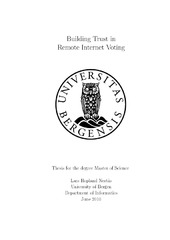| dc.description.abstract | During the past decades, a lot of research has been done to create voting protocols and election systems that facilitate voting via the Internet. Many universities and private organizations are now using such systems for referendums, or to elect individuals for its leading positions. Several countries are also moving towards electronic voting over the Internet for legally binding elections. Cryptographers and system designers have until now mainly focused on the mathematical and the technical aspects of electronic voting systems. How to build trust in these systems have not been considered in any depth (as far as the author has been able to establish). Whenever there is a change in election procedures, voters', candidates', and election officials' trust in the election system may be challenged. In this thesis, we focus on different aspects of how to build and preserve trust in remote electronic voting systems. The intended audience for this thesis is first and foremost students and IT professionals interested in remote electronic voting systems. However, the first two chapters, and several parts of Chapter 3 and Chapter 4, are not very technical oriented. Readers with some basic IT knowledge, and who are interested in the topic, are encouraged to continue reading. | en_US |
